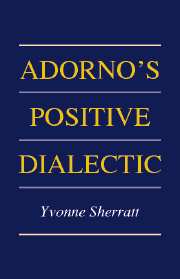Book contents
- Frontmatter
- Contents
- Preface
- Abbreviations
- Adorno's Positive Dialectic
- General Introduction
- PRELUDE TO ADORNO'S POSITIVE DIALECTIC
- Prelude I: Adorno's Intellectual Tradition: German Philosophy
- Prelude II: Adorno's Intellectual Tradition: Sigmund Freud
- ADORNO'S POSITIVE DIALECTIC: INTRODUCTION
- PART I NEGATIVE THESIS: THE DECLINE OF ENLIGHTENMENT
- PART II POSITIVE THESIS: THE REDEMPTION OF ENLIGHTENMENT
- Bibliography
- Index
PART I - NEGATIVE THESIS: THE DECLINE OF ENLIGHTENMENT
Published online by Cambridge University Press: 10 August 2009
- Frontmatter
- Contents
- Preface
- Abbreviations
- Adorno's Positive Dialectic
- General Introduction
- PRELUDE TO ADORNO'S POSITIVE DIALECTIC
- Prelude I: Adorno's Intellectual Tradition: German Philosophy
- Prelude II: Adorno's Intellectual Tradition: Sigmund Freud
- ADORNO'S POSITIVE DIALECTIC: INTRODUCTION
- PART I NEGATIVE THESIS: THE DECLINE OF ENLIGHTENMENT
- PART II POSITIVE THESIS: THE REDEMPTION OF ENLIGHTENMENT
- Bibliography
- Index
Summary
INTRODUCTION
In Part I of our monograph which focusses upon Adorno's negative thesis, expressed in his Dialectic of Enlightenment, we analyse why Adorno believes enlightenment fails. The central figure to whom Adorno is indebted for this analysis is Sigmund Freud, hence here we unravel the Freudian dimension to Adorno's depiction of enlightenment's failure.
The ‘architecture’ of the negative thesis is as follows. Chapter 1 depicts the failure of the enlightenment, linking Adorno's views on a Freudian based notion of subjectivity, the acquisition of knowledge and the enlightenment's aims. Chapter 2 focuses upon issues in Subjectivity. Chapter 3 explores the notion of knowledge acquisition. Chapter 4 looks at Adorno's own ‘negative’ solution to enlightenment's failure; and points out the limitations of this.
ENLIGHTENMENT'S FAILURE
Before embarking on the specific chapters of the negative part of the monograph, let us clarify Adorno's thesis about enlightenment's failure. We have introduced the main details of this negative philosophy of history in Prelude II. Here, however, let us remind ourselves of the main points.
Adorno in the Dialectic of Enlightenment believes the following. Enlightenment sees itself as having transcended myth; as having overcome myth's negative features of animism, immaturity, domination, fear, barbarism and regression. According to Adorno, the entire self-conception of enlightenment is formed in opposition to myth.
Adorno believes that enlightenment fails. He argues that this failure is of the nature of a regression to myth.
- Type
- Chapter
- Information
- Adorno's Positive Dialectic , pp. 73 - 74Publisher: Cambridge University PressPrint publication year: 2002



